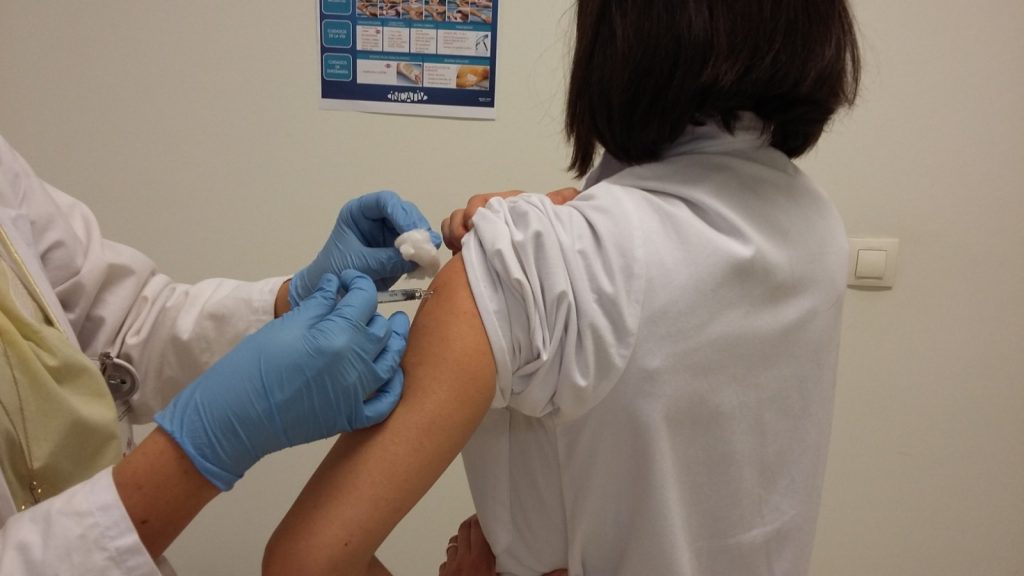Spain aims to accelerate vaccination during April with 70% of population to be vaccinated by August
Sánchez: “The time had come to vaccinate, vaccinate, and vaccinate [because] mass vaccination is the quickest way to re-activate our country and our economy.”

PHOTO CREDIT: Generalitat Valenciana
Wednesday 7th April 2021 | ALVARO MONFORT; translation MIKE SMITH
“70% of the population of Spain will be vaccinated by the end of August.” It is one of the great announcements made during the latest appearance of the President of the Spanish Government, Pedro Sanchez, meaning that the national executive isn’t losing hope of meeting its initial vaccination plan despite not yet having met the targets for the first quarter of 2021.
In his speech, Sánchez made a call to join forces in the vaccination campaign, adding that the accelerating of the process and the effectiveness of it “is the main objective of the Government of Spain”. He insisted that the time had come “to vaccinate, vaccinate, and vaccinate [because] mass vaccination is the quickest way to re-activate our country and our economy. The time has come to vaccinate relentlessly.”
However, the initial forecast of having 80% of people over 80 years of age fully vaccinated before April has not been achieved due to lack of vaccine doses. So Sánchez has set a new objective for the month of May, given the large consignment of vaccines received in recent days and those expected to arrive in the coming weeks. Thus, the government hopes to complete the first doses to the over 80s by this week and the second doses during the first half of May.
The Ministry of Health has confirmed that the next group to be vaccinated with the Pfizer, Moderna and Janssen vaccines (the latter is a single-dose vaccine of which 300,000 doses will arrive in Spain in mid-April) will be those aged between 70 and 79 years of age as well as patients considered to be “very high risk”, such as transplants, certain cancer patients, haemodialysis patients and those with Down Syndrome aged above 40. This group will be followed by those aged between 66 and 69.
The AztraZeneca vaccine (now called Vaxzevria) is now being administered to people aged between 55 and 65 in most autonomous communities, in addition to concluding the essential groups such as security forces and teaching staff.
However, this vaccine continues to raise doubts and regions such as Castilla y León have suspended its use from today Wednesday “as a precaution while waiting for a re-evaluation by the European Medicines Agency (which meets today Wednesday). The decision has been criticized by the first vice-president of the Government, Carmen Calvo, who declared that vaccination decisions are taken by the Interterritorial Council and not by an individual autonomous community, to which Castilla y León responded that its decision has the approval of the Minister of Health Carolina Darias “since it is an autonomous responsibility.
Nevertheless, the President stressed that all four vaccines currently authorized by the European Commission ((Pfizer/BioNTech, Moderna, AstraZeneca and Janssen/Johnson & Johnson) are safe and that “they have shown adequate levels of efficacy and safety”.
33 million Spanish men and women vaccinated before September
The Government predicts that, in the week beginning May 3rd, there will be five million citizens who will have received the complete vaccination and that, by the first week of June, it will be 10 million, and then 15 million in the week beginning June 14.
Sánchez also announced that, in the week beginning July 19th, it is expected that 25 million people will be vaccinated and that 70% of the population (33 million) will be immunized by the end of August.
Between April and June, 38 million doses of Pfizer, AstraZeneca, Moderna and Janssen vaccines are scheduled to arrive in Spain. This means that the country will receive 3½ times more doses of vaccines than those that arrived in Spain during the first quarter of 2021. Before June, the country will receive 5,700,000 vaccines from Janssen, which immunizes after two weeks of having been administered. The government is also in contact to purchase the German CureVac vaccine, once it is licensed.
Click below to read the original article in Spanish on Xàbia AL DÍA





